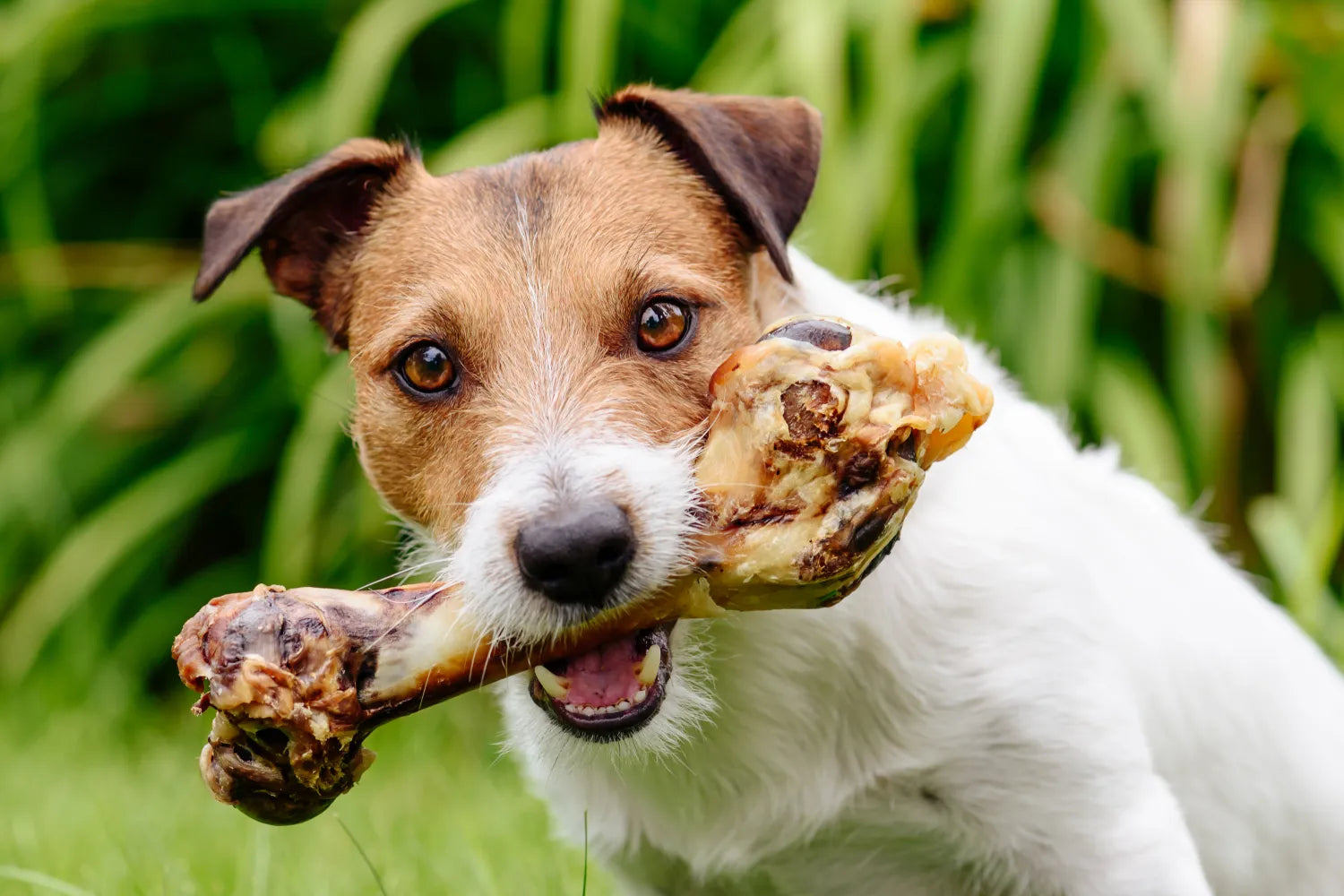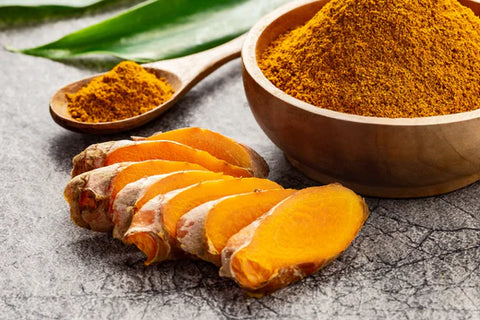
Are Bones or Antlers Better for Dogs?
When it comes to keeping our pups happy and healthy, chews play a crucial role in their daily routine. Dogs have a natural instinct to chew, which helps relieve stress, burn off energy, and keep their teeth clean.
Among the many options available, bones and antlers stand out as two of the most popular choices for dog owners. Both have long been favored for their durability and ability to keep dogs entertained for hours.
That said, when it comes to choosing the best option for your dog, you may wonder: are bones or antlers the better choice? We’re here to break down the pros and cons of both bones and antlers, comparing their nutritional benefits, durability, safety concerns, and overall effectiveness.
Whether you're looking for a natural chew option or something that offers long-lasting entertainment, understanding the key differences between bones and antlers will help you make an informed decision that’s best suited to your dog's needs.
What Makes a Good Chew for Dogs?
Before we explore the specifics of bones and antlers, it’s important to understand what makes a good chew for your dog. Dogs chew for several reasons: to relieve boredom, reduce anxiety, and maintain their dental health. A quality chew toy should be enjoyable, safe, and offer both mental stimulation and physical benefits.
A good chew toy must be durable enough to withstand your dog’s chewing habits, which can vary based on size, age, and breed. For instance, a powerful chewer might need a harder toy, while a puppy or smaller dog may prefer something softer, like a squeaky toy.
The chew toy should also be non-toxic and free from harmful chemicals, especially if your dog tends to chew vigorously or ingest parts of the toy. The safety of the toy is paramount. A chew toy that’s too hard can damage your dog’s teeth, while one that’s too soft can be quickly destroyed, leading to choking hazards.
Another important factor is the toy’s ability to promote good dental health. Toys that help clean teeth and massage gums can help prevent plaque buildup and reduce the risk of dental disease.
What Are the Benefits of Bones for Dogs?
Bones have long been a favorite chew for dogs, and for good reason. They offer several benefits that contribute to a dog’s physical and mental well-being, making them a great option for many pet owners.
One of the primary benefits of bones is their ability to promote dental health. The act of chewing on a bone helps remove plaque and tartar buildup, which can lead to gum disease and other dental issues. As your dog gnaws on the bone, the friction between the bone and their teeth helps scrub away these harmful substances, keeping their teeth cleaner and healthier.
Bones also provide natural nutrients that can be beneficial to a dog’s diet, along with nutritious dog food, like our human-grade formulas at A Pup Above. For example, marrow bones are rich in fat, which can be a good source of energy for active dogs. Some bones also contain essential minerals like calcium and phosphorus, which help support healthy bones and joints.
Also, bones can help alleviate boredom and reduce anxiety in dogs. Chewing is a natural stress reliever for many dogs, and bones provide an engaging way to keep them occupied for long periods. This can be especially helpful for dogs that are left alone for extended periods or experience separation anxiety.
However, it’s important to choose the right type of bone. Avoid cooked bones because they can splinter and cause choking or injury. Raw bones or specially made dog bones are much safer because they provide all the benefits without the risk of harm.
What Are the Benefits of Antlers for Dogs?
Antlers are another popular choice for dog chews, and they come with a distinct set of benefits that make them a solid option for many dogs. One of the main advantages of antlers is their incredible durability.
Durability
Unlike bones, which can break down over time, antlers are incredibly tough and long-lasting, making them ideal for dogs that are strong chewers or have a tendency to destroy other toys. The hardness of antlers also makes them excellent for helping to clean a dog’s teeth.
Dental Health
As dogs chew on antlers, the abrasive surface helps scrape away plaque and tartar, promoting better dental hygiene. Antlers can also massage the gums, providing added comfort and helping to prevent gum disease.
Nutritional Content
Antlers are also naturally packed with nutrients, including calcium, phosphorus, and trace minerals. These nutrients are beneficial for bone health, joint function, and overall well-being.
Chewing on antlers can contribute to your pup’s diet in a way that supports strong, healthy bones and muscles. What’s more, the marrow inside some antlers provides a tasty treat that dogs love, which can serve as an added incentive for chewing.
Odorless
Another benefit of antlers is that they are a natural, odorless option. Unlike some bones, which can emit a strong smell, antlers have a mild scent that’s less likely to bother both you and your dog. They’re also less likely to splinter compared to bones, reducing the risk of choking or injury.
While antlers can be a great chew option, it’s important to monitor your dog during chewing sessions, especially if they’re new to antlers, to ensure they don’t try to break off and swallow pieces.
What Are the Potential Risks and Safety Considerations for Bones and Antlers?
While both bones and antlers can be excellent chew options for dogs, it’s important to be aware of potential risks and safety considerations to ensure your pet’s well-being.
Splintering
One of the most common concerns with bones is the risk of splintering. Cooked bones, in particular, are prone to breaking into sharp pieces that can cause choking, blockages, or even puncture the digestive tract.
To minimize this risk, always opt for raw bones specifically designed for dogs, and avoid giving them bones that are too small for their size or shape. Always supervise your dog while chewing, and dispose of any bone fragments that might be small enough to swallow.
Tooth Damage
Antlers, although durable, can also pose risks if not used properly. Because of their hardness, antlers can potentially damage your dog’s teeth, particularly if they are an aggressive chewer.
If a dog is chewing excessively on an antler, it can lead to cracked or broken teeth, which may require veterinary attention. It’s important to choose appropriately sized antlers for your dog and monitor their chewing habits to ensure they’re not overexerting themselves.
Choking
Also, both bones and antlers can pose choking hazards if pieces break off and are swallowed. To reduce these risks, always inspect the chew regularly and replace it if it becomes too small or damaged. If your dog has a history of digestive issues or chewing problems, consult your veterinarian before introducing bones or antlers to their routine.
Wrapping Up
Ultimately, whether bones or antlers are better for your dog depends on their individual needs and chewing habits.
Bones can offer excellent natural nutrients, like calcium, and satisfy dogs’ instincts to chew, but they come with risks, such as splintering or causing tooth damage if not chosen wisely. On the other hand, antlers are durable and long-lasting, providing a healthier option for powerful chewers, though they can be tough on teeth if overused.
The key is moderation and careful supervision. Assess your pup’s chewing style and health conditions, and select the right size and type of chew to prevent any safety concerns.
Both options can be beneficial when chosen appropriately, especially when paired with human-grade fresh dog food, so consider your dog’s unique preferences and needs before making a decision.
Sources:
Can Dogs Eat Bones? Be Careful Before Giving Your Pup a Bone | American Kennel Club
Top Stories

Why Do Dogs Lick Their Paws?

Why Do Dogs Whimper & Make Noises in Their Sleep?

Healthy Vet-Approved Homemade Dog Food Recipes

How To Cook Sweet Potatoes for Dogs






















